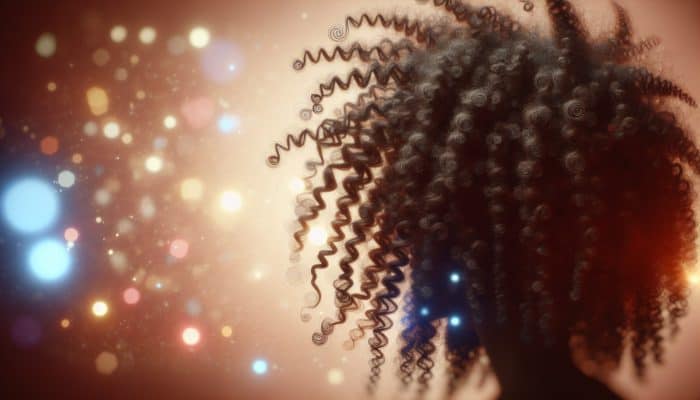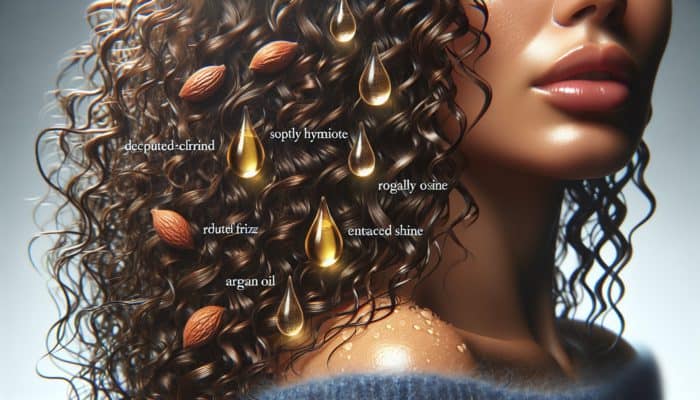Unlock the Secrets to Effective Coily Hair Care Techniques
Diving Deep into the Unique Traits of Coily Hair

Coily hair stands out as a truly stunning hair type, celebrated for its intricate structure characterized by tightly curled spirals that create a striking visual appeal. This remarkable texture not only enhances the wearer’s individuality but also presents unique challenges that demand dedicated care. Coily hair is particularly prone to dryness and frizz due to its curl pattern, which can inhibit the natural oils from the scalp from traveling down the hair shaft. As a result, achieving the coveted softness and manageability associated with healthy hair poses a significant challenge for individuals with coily curls. Understanding and addressing these specific needs is essential for effective hair care.
Gaining a comprehensive understanding of the scientific principles behind coily hair is crucial for implementing successful hair care strategies. The unique curl pattern is largely determined by the shape of the hair follicle; for instance, oval-shaped follicles typically yield curlier hair, while round follicles produce straighter strands. This distinctive structure adds to the overall allure of coily hair but also complicates routine maintenance. Thus, appreciating these fundamental elements is vital for anyone seeking to learn how to effectively treat coily hair for enhanced softness.
The Critical Role of Moisture in Coily Hair Maintenance
Moisture is the cornerstone of healthy coily hair; without it, the strands can quickly deteriorate into a state of lifelessness and brittleness. The hydration levels in coily hair directly influence its elasticity, which is essential for minimizing breakage and promoting healthy hair growth. When coily hair is deprived of moisture, it becomes increasingly delicate and prone to split ends, significantly impeding its growth potential.
Establishing a thorough hydration routine is essential for nurturing and maintaining soft, healthy coily hair. This comprehensive approach includes the use of hydrating products applied externally, alongside ensuring adequate internal hydration by consuming sufficient water daily. Numerous studies support the connection between water intake and hair vitality, indicating that proper hydration significantly impacts hair texture and overall health. For individuals keen to grasp how to treat coily hair for improved softness, prioritizing moisture retention can yield dramatic results.
Identifying Your Hair Type for Tailored Care Solutions
Determining whether your coily hair falls into type 3 or type 4 is paramount, as this classification can significantly influence your hydration strategy. Type 3 hair typically features looser curls with a well-defined pattern, while type 4 hair is characterized by tighter, zigzag curls that often face challenges like dryness. Recognizing your specific hair type empowers you to customize products and techniques that effectively meet your unique needs.
For instance, individuals with type 4 hair may find that richer creams and oils are more effective at combating dryness, whereas those with type 3 hair might achieve better results with lighter gels and custards. Understanding these distinctions is crucial for anyone navigating the complexities of how to treat coily hair for enhanced softness. By personalizing your care approach, you not only enhance the texture of your hair but also improve its overall health, resulting in a more manageable and vibrant appearance.
Choosing the Best Hydrating Shampoos and Conditioners

Finding the Ideal Shampoo for Coily Hair
Selecting the right shampoo is fundamental to establishing an effective hair care regimen, especially for individuals with coily hair. It is advisable to choose shampoos enriched with hydrating ingredients such as aloe vera and glycerin, both of which are celebrated for their ability to cleanse gently without stripping the hair of its essential natural oils. Unlike traditional shampoos that may contain harsh sulfates, hydrating shampoos are specifically formulated to maintain moisture levels while efficiently removing dirt and product buildup.
The right shampoo selection can greatly impact the success of your hair care routine; a well-formulated hydrating shampoo provides a solid foundation for achieving enhanced softness. For those eager to discover how to treat coily hair for optimal softness, picking the correct cleansing product can make a significant difference. Remember to follow up with a conditioner that complements your shampoo, ensuring a holistic and effective hydration strategy.
Harnessing the Power of Deep Conditioning Treatments
Deep conditioning treatments are a vital component of any coily hair care routine. These intensive treatments penetrate deeply into the hair shaft, replenishing lost moisture and rejuvenating the strands from within. The result is softer, more manageable coily hair that effectively combats frizz and dryness. Regular deep conditioning also enhances elasticity, which is crucial for preventing breakage and maintaining hair length.
Utilizing a deep conditioner rich in hydrating ingredients like shea butter or coconut oil can dramatically elevate the texture of coily hair. The frequency of deep conditioning should be tailored to your hair’s specific needs—those with particularly dry or damaged hair may benefit from weekly treatments, while others might prefer bi-weekly applications. By incorporating deep conditioning into your routine, you can unlock the secrets of how to treat coily hair for enhanced softness, ultimately revealing its potential for vibrancy and health.
Understanding the Benefits of Leave-In Conditioners

Leave-in conditioners are essential for maintaining hydration throughout the day. These lightweight formulas are designed to be applied after washing and can significantly reduce frizz while enhancing softness. They act as a protective shield, delivering continuous moisture and nourishment to coily hair.
For individuals looking to maximise hydration, a quality leave-in conditioner can be a game changer. Seek products that include ingredients like jojoba oil or argan oil, both renowned for their outstanding moisturising properties. When combined with a suitable styling routine, leave-in conditioners can help achieve the desired softness and manageability indicative of healthy coily hair. Understanding and implementing this aspect of care is crucial to mastering how to treat coily hair for optimal softness.
Establishing a Consistent Hydration Routine
Regular hydration through the use of shampoos and conditioners is vital for the overall health of coily hair. Consistently incorporating hydrating products helps to prevent dryness and breakage, enhancing a vibrant and healthy appearance. Maintaining a routine focused on regular hydration not only supports moisture retention but also significantly boosts the natural shine and softness of the hair.
For optimal results, consider integrating a weekly or bi-weekly treatment that focuses on rejuvenating hydration. This could involve using masks specifically designed for coily hair or treatments rich in nutrients that complement your existing regimen. Committing to consistent hydration routines can lead to remarkable enhancements in the overall texture and manageability of coily hair, making the journey to discovering how to treat coily hair for enhanced softness considerably smoother.
Applying Proven Moisturising Techniques for Coily Hair
Mastering the L.O.C. Method for Optimal Moisture Retention
The L.O.C. method, which stands for Liquid, Oil, and Cream, is a highly effective technique for locking in moisture in coily hair. This systematic layering process ensures that each product serves its specific purpose, ultimately leading to softer, well-hydrated strands. The first step involves applying a liquid product—this could be water or a hydrating spray—to thoroughly saturate the hair. Following this, an oil is applied to seal in the moisture, and lastly, a cream is used to provide added definition and hydration.
Employing the L.O.C. method can yield significant benefits for those seeking to deepen their understanding of how to treat coily hair for enhanced softness. Each step plays a crucial role in ensuring moisture retention while minimizing frizz. The effectiveness of this method may vary based on individual hair types, so a bit of experimentation might be necessary to discover the ideal combination that works best for your hair.
Incorporating Protective Styles for Healthier Coily Hair
Protective styling is an invaluable strategy for preserving the health of coily hair. Styles such as braids, twists, and updos not only enhance visual appeal but also serve practical purposes. These styles protect the hair’s ends, which are often the most susceptible to damage and dryness. By retaining moisture within the strands, protective styles play a crucial role in maintaining the softness and health of coily hair.
Integrating protective styles into your hair care routine can also minimize manipulation—an often-overlooked cause of breakage in coily hair. Moreover, styles that tuck away the ends can be maintained for extended periods, allowing deep conditioning treatments to work effectively while the hair remains shielded. For anyone eager to learn how to treat coily hair for enhanced softness, adopting protective styles can be a savvy strategy for achieving and sustaining that desirable softness.
The Importance of Regular Moisturising Practices for Coily Hair
Regular application of a lightweight moisturiser can significantly transform the health of coily hair. This daily ritual helps combat the natural dryness that frequently accompanies coily textures. By incorporating a light, hydrating product into your routine, you can maintain softness throughout the day, reducing frizz and promoting a more defined curl pattern.
Choosing the right type of moisturiser is crucial—look for those containing hydrating components like aloe vera or glycerin. These nourishing ingredients will not only deliver essential moisture but also assist in sealing hydration without weighing down your curls. Implementing a daily moisturising routine can be a pivotal factor in mastering how to treat coily hair for enhanced softness, allowing for a more vibrant, healthy appearance.
Integrating Deep Conditioning Treatments into Your Hair Care Routine
Deep conditioning treatments should be viewed as a cornerstone in the hair care regimen for coily hair. These intensive treatments penetrate the hair shaft, offering a powerful boost of moisture that can dramatically transform the hair’s texture. Regular deep conditioning restores moisture levels, strengthens the hair, and enhances its natural softness and manageability.
Selecting the right deep conditioner is vital; look for products that are rich in natural oils and butters, such as shea butter or coconut oil, both celebrated for their nourishing properties. The frequency of deep conditioning should be personalised to match your hair’s condition—depending on its needs, treatments can be performed weekly or even more frequently. By committing to this practice, individuals can unlock the secrets of how to treat coily hair for enhanced softness, leading to healthier, more luxurious-looking hair.
Utilising Natural Oils and Butters for Superior Coily Hair Care
Discovering the Hydrating Qualities of Coconut Oil
Coconut oil is widely praised for its exceptional ability to penetrate the hair shaft, delivering intense hydration and reducing protein loss. This unique characteristic makes it particularly beneficial for coily hair, which often struggles with moisture retention. Regular application of coconut oil not only moisturises the hair but also promotes a softer texture, significantly enhancing overall manageability.
Additionally, coconut oil is rich in fatty acids that can strengthen the hair and prevent breakage. Its antimicrobial properties also make it an excellent choice for maintaining a healthy scalp, thereby promoting hair growth. Those eager to learn how to treat coily hair for enhanced softness will find coconut oil to be an invaluable addition to their hair care toolkit, providing transformative hydration and nourishment.
Harnessing Shea Butter for Coily Hair Nourishment
Shea butter is a remarkable ingredient celebrated for its rich vitamin content and fatty acids that nourish and soften coily hair. This natural emollient excels at sealing in moisture and enhancing shine, making it a preferred choice among individuals with coily textures. Its creamy consistency allows for easy application, ensuring that every strand receives the essential hydration it craves.
Incorporating shea butter into your hair care routine can lead to significant improvements in softness, as it penetrates deeply into the hair shaft while providing a protective barrier against environmental stressors. It can also help reduce frizz and enhance curl definition, making it an ideal companion for anyone looking to master how to treat coily hair for enhanced softness effectively.
Exploring Other Beneficial Oils for Coily Hair Care
Oils such as argan and jojoba also play a significant role in improving the softness of coily hair. Argan oil, often dubbed “liquid gold”, is renowned for its high levels of antioxidants and essential fatty acids that nourish and repair damaged hair. Jojoba oil, which closely resembles the natural sebum produced by the scalp, acts as an excellent moisturiser that aids in moisture retention.
Incorporating these oils into your hair care routine can provide additional moisture and nourishment, resulting in enhanced softness and manageability. By diversifying the oils used, individuals can explore various combinations that best suit their unique hair type and needs, making significant strides in their quest to learn how to treat coily hair for enhanced softness.
Understanding the Benefits of Olive Oil for Coily Hair
Olive oil is packed with antioxidants and vitamins, making it an excellent choice for moisturizing and repairing damaged coily hair. Its lightweight nature allows it to penetrate the hair shaft seamlessly, delivering hydration without leaving a greasy residue. This makes olive oil suitable for daily application, aiding in the maintenance of softness and preventing breakage.
In addition to its hydrating advantages, olive oil can also enhance the overall health of coily hair by nourishing the scalp and reducing inflammation. This comprehensive approach to hair care ensures that individuals focus not just on the strands but also on the health of the scalp. Those aiming to discover how to treat coily hair for enhanced softness should consider incorporating olive oil as a staple in their routine for optimal benefits.
Utilising Mango Butter for Enhanced Moisture Retention
Mango butter offers intense hydration and is rich in nutrients that encourage healthy, soft coily hair. Renowned for its emollient properties, mango butter aids in sealing in moisture while enhancing the hair’s natural shine. Its rich texture makes it ideal for deep conditioning treatments or as a leave-in product to maintain softness throughout the day.
Integrating mango butter into your hair care regimen can lead to significant improvements in the texture of coily hair, making it a fantastic option for those looking to master the art of how to treat coily hair for enhanced softness. With consistent use, you may discover not only enhanced softness but also improved overall hair health and vibrancy.
Avoiding Common Mistakes in Coily Hair Care
Understanding the Dangers of Over-Washing Coily Hair
One of the most common pitfalls for individuals with coily hair is the tendency to over-wash their locks. Frequent washing can strip coily hair of its natural oils, leading to excessive dryness and a reduction in softness. The unique structure of coily hair inherently limits moisture retention, making it imperative to preserve the natural oils produced by the scalp.
To alleviate this problem, it is advisable to wash coily hair no more than once or twice a week, tailored to your lifestyle and the specific needs of your hair. When washing, always use a gentle, hydrating shampoo that cleanses without stripping essential moisture. Understanding the delicate balance between cleanliness and moisture retention is crucial for effectively mastering how to treat coily hair for enhanced softness.
Minimising Heat Damage for Healthier Coily Hair
Excessive use of heat styling tools can lead to significant damage for coily hair, making it brittle and less soft. High temperatures can strip away moisture and vital nutrients, causing the hair cuticles to lift and become porous. This results in increased frizz and decreased softness, which can be disheartening for those who cherish their coily locks.
To prevent heat damage, consider embracing your natural texture more frequently and limiting the use of heat styling tools. When you do choose to use heat, always apply a high-quality heat protectant to safeguard your strands. Learning to embrace low-heat or heat-free styling options can significantly aid in your pursuit of how to treat coily hair for enhanced softness, allowing your natural beauty to shine through.
Steering Clear of Harsh Chemicals in Hair Products
Harsh chemicals commonly found in many commercial hair products can severely damage coily hair, stripping away moisture and leading to breakage. Ingredients such as sulfates and <a href="https://limitsofstrategy.com/blood-alcohol-level-testing-your-essential-guide/">alcohol</a> should be avoided, as they can disrupt the hair’s natural moisture balance.
When selecting products, it is best to choose those formulated specifically for coily or curly hair, which are often free from harmful chemicals and enriched with hydrating ingredients. This mindful approach can greatly enhance your understanding of how to treat coily hair for enhanced softness, paving the way for a healthier and more manageable hair type.
The Intricate Relationship Between Diet and Hair Hydration
The Essential Role of Sufficient Water Intake
Internal hydration is just as important as external treatments when it comes to maintaining the softness of coily hair. Adequate water consumption plays a fundamental role in overall health, directly impacting hair quality. When the body is well-hydrated, this is reflected in the hair, resulting in softer and more resilient strands.
To ensure optimal hydration, aim to drink at least 2 litres of water daily, adjusting this amount based on your activity levels and environmental conditions. By prioritising water intake, individuals can take significant steps towards mastering how to treat coily hair for enhanced softness, culminating in healthier and more vibrant locks.
Nutrients Essential for Boosting Hair Health
A diet rich in omega-3 fatty acids and vitamins A, C, and E can significantly enhance the softness and health of coily hair. These vital nutrients work synergistically to nourish hair follicles and improve moisture retention. Incorporating foods such as salmon, avocados, nuts, and leafy greens should be staples in the diet of anyone aiming to improve their hair health.
Incorporating a variety of colourful fruits and vegetables not only provides crucial vitamins but also aids in overall bodily hydration. Recognising the essential connection between diet and hair quality is vital for those who wish to learn how to treat coily hair for enhanced softness, emphasizing the importance of a holistic approach to hair care.
Examining the Potential of Supplements for Hair Vitality
While a balanced diet is crucial, supplements can also significantly contribute to promoting healthy coily hair. For instance, biotin is frequently recommended for improving hair thickness and strength. Additionally, omega-3 supplements can provide extra hydration benefits, especially for individuals who may struggle to obtain enough from dietary sources.
Before starting any supplement regimen, it is wise to consult with a healthcare professional to ensure it aligns with your health needs. By incorporating beneficial supplements, individuals can further enhance their understanding of how to treat coily hair for enhanced softness, paving the way for improved hair health.
Recognising the Impact of Dehydration on Hair Quality
Insufficient hydration can lead to dry, brittle coily hair, significantly increasing the risk of breakage and dullness. When the body is dehydrated, it prioritizes essential functions, often compromising hair quality. Recognizing this connection underscores the importance of maintaining adequate hydration levels for overall hair vitality.
To combat the effects of dehydration, it is essential to integrate more hydrating foods into your diet, alongside increasing water intake. Acknowledging the detrimental impact of dehydration on hair can empower individuals to take proactive steps in their hair care journey, particularly when striving to learn how to treat coily hair for enhanced softness.
Avoiding Foods That Hinder Optimal Hair Health
Processed foods and high sugar consumption can adversely affect the moisture and overall health of coily hair. These foods may lead to inflammation and poor circulation, both of which can impede hair growth and vitality. Instead, focus on whole, nutrient-dense foods that support hair health and hydration.
Opt for a diet rich in vibrant fruits, vegetables, and lean proteins, providing the essential vitamins and minerals necessary for thriving coily hair. By being mindful of dietary choices, individuals can significantly enhance their understanding of how to treat coily hair for enhanced softness, fostering a healthier environment for their hair.
Addressing Common Questions Related to Coily Hair Care
What are the best products to use for coily hair?
Hydrating shampoos and conditioners containing ingredients like aloe vera, glycerin, and natural oils are ideal for coily hair. Look for products specifically formulated for curly or coily textures to ensure optimal results.
How often should I wash my coily hair for best results?
Aim to wash coily hair no more than once or twice a week to avoid stripping natural oils. This practice helps maintain moisture levels and softness, which are crucial for the health of coily hair.
Can my diet truly influence the softness of my coily hair?
Yes, a diet abundant in vitamins A, C, E, and omega-3 fatty acids can significantly enhance the softness and health of coily hair, supporting its overall vitality and appearance.
What are effective methods to reduce frizz in coily hair?
Utilising leave-in conditioners, oils, and the L.O.C. method can be very effective in minimising frizz. Additionally, protective hairstyles help retain moisture, promoting softer hair.
Is heat styling harmful to coily hair?
Excessive heat styling can lead to considerable damage and dryness. It’s advisable to limit the use of heat tools and always apply a heat protectant when styling to prevent harm.
What exactly does the L.O.C. method entail?
The L.O.C. method refers to the layering technique involving Liquid, Oil, and Cream. This method effectively locks in moisture and maintains softness in coily hair.
Are natural oils beneficial for coily hair care?
Absolutely! Oils such as coconut, olive, and jojoba are known for providing deep hydration, reducing frizz, and enhancing softness in coily hair.
How frequently should I deep condition my coily hair?
Deep conditioning should ideally be done weekly or bi-weekly, depending on the specific needs of your hair. This practice restores moisture and improves manageability, contributing to healthier hair.
Can I use regular shampoo on coily hair without complications?
It’s best to avoid regular shampoos containing sulfates. Instead, opt for hydrating shampoos specifically designed for coily or curly hair to achieve the best results.
What dietary choices should I avoid for optimal hair health?
Processed foods and high sugar items can negatively impact hair health. Focus on whole foods rich in nutrients to support your hair’s well-being and hydration.
Connect with us on Facebook!
The Article: How to Treat Coily Hair for Softness: A Guide to Hydration appeared first on Amitys Hair Salon.
The Article Treat Coily Hair for Softness: Essential Hydration Tips Was Found On https://limitsofstrategy.com



